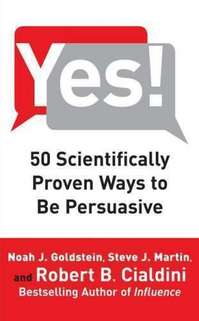 A friend just pointed out this link, 50 Scientifically Proven Ways To Be Persuasive. It’s pretty fascinating stuff, excerpted from Yes! 50 Scientifically Proven Ways to Be Persuasive, by Noah Goldstein, Steve Martin, and Robert Cialdini. Some of it’s psychological research done for advertisers, other from more general psychological studies. these are the kinds of things advertisers use to manipulate us into buying the latest iWhosie, so it’s helpful to know for that reason alone to save money–not to mention how to do some convincing yourself.
A friend just pointed out this link, 50 Scientifically Proven Ways To Be Persuasive. It’s pretty fascinating stuff, excerpted from Yes! 50 Scientifically Proven Ways to Be Persuasive, by Noah Goldstein, Steve Martin, and Robert Cialdini. Some of it’s psychological research done for advertisers, other from more general psychological studies. these are the kinds of things advertisers use to manipulate us into buying the latest iWhosie, so it’s helpful to know for that reason alone to save money–not to mention how to do some convincing yourself.
Here are a few highlights:
– The perception of scarcity creates demand (“It’s the famous change from “Call now, the operators are standing by” to “If the line is busy, call again”, that greatly improved the call volume by creating the impression that everybody else is trying to buy the same product.”)
– Being tired makes you more vulnerable to other people’s arguments (stay away from the late-night infomercials!)
– Citing others’ negative behavior reinforces negative behavior. (“Petrified Forest National Park A/B tested two versions of a sign imploring people not to steal pieces of petrified forest from the park. One mentioned large amounts of petrified forest taken away on an annual basis, the other one simply asked the visitors not to remove petrified wood. The first one actually tripled the theft ratio as it showed stealing petrified wood as something commonplace. Same effect was observed after airing an ad that implored women to vote, but mentioned that 22 million single women did not vote last year. That kind of information actually portrays not voting as more socially acceptable.”)
– Giving someting away makes it less desirable. (This might be a good one to apply to our relationships–if we over-give, we can be under-valued.)
– Admitting you’re wrong makes people trust you more.
– Verbalization helps interaction. (“Waiters who repeat customers’ order to them make 70% more in tips than waiters who just say “Okay”. Our mind subconsciously appreciates the effort taken to ensure the things are perfectly right.” I could also see how this could work socially–“mirroring” poeple back to themselves makes them feel heard, therefore more appreciative, therefore, more open to whatever it is you have to say.)

